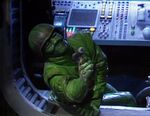Chimeron: Difference between revisions
(Not noteable) |
GhastlyKhaos (talk | contribs) No edit summary |
||
| Line 10: | Line 10: | ||
|individuals = <ul><li>[[Delta]]</li><li>[[Billy (Delta and the Bannermen)|Billy]] (former [[Human]])</li><li>[[Chimeron Princess]]</li></ul> | |individuals = <ul><li>[[Delta]]</li><li>[[Billy (Delta and the Bannermen)|Billy]] (former [[Human]])</li><li>[[Chimeron Princess]]</li></ul> | ||
}} | }} | ||
The '''Chimeron''' (pronounced | The '''Chimeron''' (pronounced shim-er-on) were a race of insect-behaviored [[humanoid]]s who were nearly made extinct by the [[Bannermen]]. | ||
==Biology== | ==Biology== | ||
===Appearance=== | ===Appearance=== | ||
[[File:Chimeron child.jpg|left|thumb|150px|A newborn Chimeron. ([[DW]]: ''[[Delta and the Bannermen]]'')]] | [[File:Chimeron child.jpg|left|thumb|150px|A newborn Chimeron. ([[DW]]: ''[[Delta and the Bannermen]]'')]] | ||
Chimerons hatched from large grey eggs and started as green, wrinkly infants. Though males kept this appearance throughout their life, the [[queen]]s of the species had a slightly different development. In order to properly develop, the young queens were fed [[Chimeron jelly]] until they were fully grown. | Chimerons hatched from large grey eggs and started as green, wrinkly infants. Though males kept this appearance throughout their life, the [[queen]]s of the species had a slightly different development. In order to properly develop, the young queens were fed [[Chimeron jelly]] until they were fully grown. | ||
Their coimg into adulthood was marked by the [[Singing time]]. In the first few hours, they rapidly grew and became more [[Human]]-like, developing hair and other more distinct facial features and starting to lose their wrinkles. Adult queen Chimerons looked similar to [[Human]] females with slightly green skin and grey patches behind the ears. ([[DW]]: ''[[Delta and the Bannermen]]'') | Their coimg into adulthood was marked by the [[Singing time]]. In the first few hours, they rapidly grew and became more [[Human]]-like, developing hair and other more distinct facial features and starting to lose their wrinkles. Adult queen Chimerons looked similar to [[Human]] females with slightly green skin and grey patches behind the ears. ([[DW]]: ''[[Delta and the Bannermen]]'') | ||
| Line 30: | Line 30: | ||
==History== | ==History== | ||
The Chimerons were nearly wiped out by the [[Bannermen]], but the last queen, Delta, was able to escape with an egg. The egg hatched on [[Earth]], and with the assistance of [[Seventh Doctor|the Doctor]], Delta and her daughter were able to escape annihilation by the [[Bannermen]]. | The Chimerons were nearly wiped out by the [[Bannermen]], but the last queen, Delta, was able to escape with an egg. The egg hatched on [[Earth]], and with the assistance of [[Seventh Doctor|the Doctor]], Delta and her daughter were able to escape annihilation by the [[Bannermen]]. | ||
They left Earth along with [[Billy (Delta and the Bannermen)|Billy]], a [[Human]] who Delta had fallen in love with. He took some Chimeron Jelly so as to become a Chimeron; without him the species could not continue. ([[DW]]: ''[[Delta and the Bannermen]]'') | They left Earth along with [[Billy (Delta and the Bannermen)|Billy]], a [[Human]] who Delta had fallen in love with. He took some Chimeron Jelly so as to become a Chimeron; without him the species could not continue. ([[DW]]: ''[[Delta and the Bannermen]]'') | ||
Revision as of 13:53, 6 February 2011
The Chimeron (pronounced shim-er-on) were a race of insect-behaviored humanoids who were nearly made extinct by the Bannermen.
Biology
Appearance
Chimerons hatched from large grey eggs and started as green, wrinkly infants. Though males kept this appearance throughout their life, the queens of the species had a slightly different development. In order to properly develop, the young queens were fed Chimeron jelly until they were fully grown.
Their coimg into adulthood was marked by the Singing time. In the first few hours, they rapidly grew and became more Human-like, developing hair and other more distinct facial features and starting to lose their wrinkles. Adult queen Chimerons looked similar to Human females with slightly green skin and grey patches behind the ears. (DW: Delta and the Bannermen)
Abilities
Chimeron queens also developed a strong singing voice, partly as communication and partly as a powerful means of defence. Once they reached the Singing Time, they perfected their defensive songs and reached closer to adult size. Adult queens could detect high frequencies with grey patches behind their ears. (DW: Delta and the Bannermen)
Technology
Chimeron's were equipped with high level weaponry and also possessed spaceships. A portable incubator was used to house a Chimeron egg before it hatched.
Chimerons also produced Chimeron jelly, though whether this was a natural process or manufactured is unknown. The jelly was capable of converting other species (Humans, at least) into other Chimerons. The side effects of this process were unknown. (DW: Delta and the Bannermen)
History
The Chimerons were nearly wiped out by the Bannermen, but the last queen, Delta, was able to escape with an egg. The egg hatched on Earth, and with the assistance of the Doctor, Delta and her daughter were able to escape annihilation by the Bannermen.
They left Earth along with Billy, a Human who Delta had fallen in love with. He took some Chimeron Jelly so as to become a Chimeron; without him the species could not continue. (DW: Delta and the Bannermen)
| ||||||||||||||



